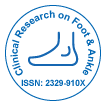Editorial 黑料网
Advanced Procedures in Foot and Ankle Surgery
Thomas S Roukis*Orthopaedic Center, Gundersen Health System, South Avenue, La Crosse, Wisconsin, US
- Corresponding Author:
- Thomas S Roukis
Orthopaedic Center, Gundersen Health System
Mail Stop: C02-006, 1900 South Avenue
La Crosse, Wisconsin 54601-5467
Tel: 608-775-9673
Fax: 608-775-6707
E-mail: tsroukis@gundersenhealth.org
Received Date: November 02, 2016; Accepted Date: November 07, 2016; Published Date: November 11, 2016
Citation: Roukis TS (2016) Advanced Procedures in Foot and Ankle Surgery. Clin Res Foot Ankle 4:e108. doi:10.4172/2329-910X.1000e108
Copyright: © 2016 Thomas S Roukis. This is an open-access article distributed under the terms of the Creative Commons Attribution License, which permits unrestricted use, distribution, and reproduction in any medium, provided the original author and source are credited.
Visit for more related articles at Clinical Research on Foot & Ankle
Editorial
Clinical Research on Foot and Ankle is an academic peer-reviewed international journal that publishes articles on a wide range of fields related to foot surgery, sports medicine, Achilles heels problem, different techniques of physical therapies, wound management and healing procedure, and other medical issues related to ankle care. The previous issue Volume 4, Issue 2 of the Journal published five research articles and two case reports.
Madadi et al. [1] in their research article conducted a systematic review of attaining better knowledge on the usefulness of different imaging modalities in the diagnosis of calcaneal fracture. Authors concluded that literature on evaluating different imaging modalities was completely lacking or very limited. They further talked about the limitations of their study, saying that their study could not muster enough support to establish the advantage of one modality over the other. In the research article Amaha et al. [2] assessed anterolateral ankle pain in two distinct areas by using computed tomography (CT) and magnetic resonance imaging (MRI) with arthroscopic examination. Authors concluded that scar tissue formation due to inadequate care and the presence of microinstability might be the etiologic factors associated with abnormal findings.
Matsubara et al. [3] in their studies investigated the relationship between Toe grip strength (TGS) and hallux valgus angle (HVA) in children. Authors found that HVA is greater in girls when compared with boys whereas in girls, weak TGS correlates with hallux valgus. Authors suggested that strengthening TGS would prevent the onset of hallux valgus and help in the development of good foot posture.
Howard et al. [4] study tried to enhance the patient comprehension of communication materials, specifically such as information leaflets for obtaining consent to elective ankle and foot surgery. Authors concluded that personalized letters are effective as low-cost boost to patient’s knowledge on foot and ankle pathology and treatment. Roukis [5] described the deformities associated with the total Ankle Replacement surgery while Stone et al. [6] reported Non-Healing Wounds associated with Klippel-Trenaunay Weber Syndrome in a patient, Cancelliere [7] discussed the Tibial Deformity affecting the Ankle and Foot.
References
--Share This Article
Relevant Topics
Recommended Journals
Article Tools
Article Usage
- Total views: 10277
- [From(publication date):
November-2016 - Nov 25, 2024] - Breakdown by view type
- HTML page views : 9611
- PDF downloads : 666
